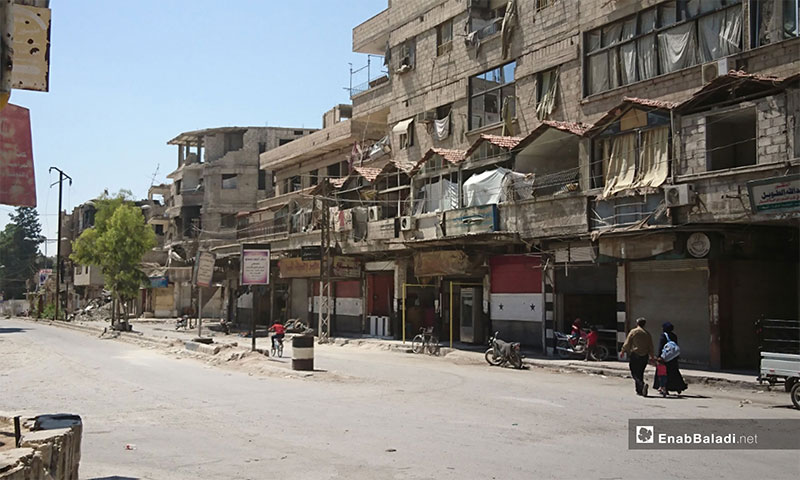Enab Baladi – Eastern Ghouta
After relieving his foot pain from standing all day in line to get a bundle of bread, Abdullah recounted his suffering in providing his family with a loaf of bread in the city of Douma, east of the Syrian capital, Damascus.
He told Enab Baladi that “Most people do not get enough bread from the government-run bakeries, which drives them and me to buy an unsubsidized “touristic” bread—bread fortified with milk and sugar. This exuberates the suffering of people on the economic and social levels.”
Abdullah, aged 52, lives in Douma, in the eastern Ghouta of the capital, Damascus, and has not easily obtained a loaf of bread since the beginning of this year.
Abdullah, which Enab Baladi is cautious not to mention his full name for security reasons, sells vegetables on a street stall in Douma. Abdullah complains that the price of a single bundle of bread has risen from 50 ( SYP- 0.01 USD) to 100 Syrian pounds (0.03 USD) in the last three months, not to mention the difficulty of obtaining it; a person has to wait in a queue for a long time to get bread on a daily basis.
Since the Syrian regime re-established control over the city of Douma in 2018, its people have been shrouded in the shadow of the bread crisis, due to the very low-interest rate provided in the service sector in the city; the private and public facilities, and food associations are neglected by the city council and the responsible government entities.
The city council made no official comments on the bread crisis, but implied in a post on its Facebook page published on 1 June to its causes, the first of which is what he called “people’s waste of bread, and transferring its crumbs into animal feed.
The post also indicated that the US forces set fire to hectares of the wheat crops used in flour production. This post given by the local council is compatible with the information spread about accusing Washington of deliberately burning wheat fields in eastern Syria.
The Syrian government has proceeded to reduce the allocations of flour and fuel for the bakeries already damaged by bombing.
With the entry into force of the “Caesar” law, on 17 June, the price of a touristic bundle of bread in the city increased to 1,000 SYP (0.38 USD), as monitored by Enab Baladi.
Abdullah is one of the thousands of people who are experiencing this crisis in the city, where Umm Mustafa is trying to provide her five children with food on her own because the Syrian regime has arrested her husband since 2014, on charges of protesting and criticizing the government’s policy.
Umm Mustafa, who spoke on condition of anonymity for security reasons, cannot stand for long hours in front of the bread distribution centers and bakeries, pushing her to resort to alternative methods to obtain bread that is sufficient for her children.
Umm Mustafa buys wheat and barley from the market to make her own homemade pita bread so that she does not have to buy the expensive touristic one.
The people of the area are preoccupied with looking for alternative methods and mechanisms for obtaining a loaf of bread and securing its primary material to feed their children. They appear to have no intention to protest against the Syrian regime, unlike other cities such as As-Suwayda, in southern Syria because of what they suffered during the years of siege which was imposed by the Syrian regime between 2013 and 2014.

